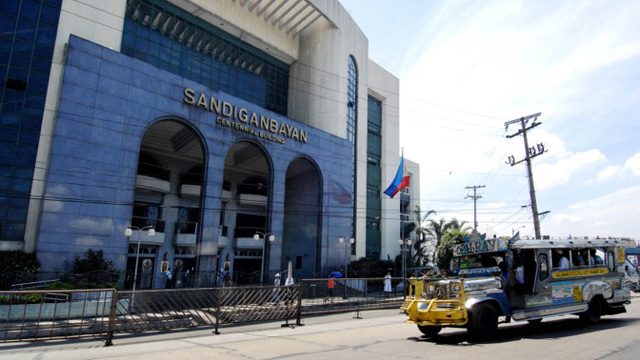SUMMARY
This is AI generated summarization, which may have errors. For context, always refer to the full article.
 Only now are we seeing lawmakers jailed, those who were involved in the multi-billion peso pork barrel scam – a scheme that enabled politicians to pocket billions of pesos in public funds. This certainly isn’t the first time but in the Philippines – jail isn’t a place they stay in for too long. Nor is convicted a word they hear very often. (READ: IN PHOTOS: Senators’ detention center in Camp Crame)
Only now are we seeing lawmakers jailed, those who were involved in the multi-billion peso pork barrel scam – a scheme that enabled politicians to pocket billions of pesos in public funds. This certainly isn’t the first time but in the Philippines – jail isn’t a place they stay in for too long. Nor is convicted a word they hear very often. (READ: IN PHOTOS: Senators’ detention center in Camp Crame)
Our institutions are failing us. And with each failure to convict the guilty, the judiciary only gets weaker. (READ: Plunder in the Philippines)
The pardon of ex-President Joseph Ejercito Estrada from plunder charges struck a detrimental blow to our democracy. Instead of taking the opportunity to strengthen the judicial system, former President Gloria Macapagal Arroyo’s pardon of the other ex-president weakened it further, setting precedent for future plunderers to get away with stealing without consequence.
Many say Arroyo foresaw her own future and that’s why she had to do it. She herself faces charges of electoral fraud and misuse of public funds. Given her current cases, by pardoning Erap, she actually got it right.
But unfortunately for Arroyo, neither the courts nor the current administration have shown her the same mercy. (READ: Sandiganbayan denies Arroyo’s motion for bail a third time)
The arrests of those charged in the pork barrel scandal came on June 20 and 23, complete with song, drama and tears. The accused responded to plunder charges with indignation. They will not resign. They cry foul, political persecution and insist that they are the victims.
But for the rest of the country, who are already fed up with broken institutions, the arrests were a day many had been waiting for.
The Sandiganbayan – the Philippines’ anti-graft court – is finally doing what it is meant to do, giving the accused plunderers their day in court and – hopefully – implementing the laws that were created for the very purpose of punishing those who steal. Could this be a sign of hope that Filipinos have been waiting decades for? But for as long as a verdict hasn’t been handed down, most aren’t buying it just yet.

Many Filipinos abroad – and here at home – have given up on their country. It’s hard to blame them. It is difficult to convince anyone that times have changed – no matter how cute or clever our tourism campaigns may be – when the same old story of corruption and disparity persists. Only when the courts begin to convict will we prove that our systems are beginning to work.
True, corruption is not unique to the Philippines. Nearly every country deals with some form of corruption. The difference – however – is in how the country deals with it.
Even the United States has its fair share of corruption scandals. Take former Detroit Mayor Kwame Kilpatrick as an example. He was caught in a massive corruption scandal in 2008 and was slapped with 12 counts of criminal charges related to misconduct and corruption.
Kilpatrick did a Napoles. In one instance, it was said he funneled state money to two “vague” organizations and subcontracted work with a company called U.N.I.T.E. Guess who owned that company? Kilpatrick’s wife.
Well, doesn’t that story sound familiar?
But look what happened. Kilpatrick was tried and convicted in 2008, shortly after stepping down (yes, he actually stepped down) – and was convicted on several more charges in 2012. His 2012 conviction carried a sentence of 28 years.
Have any of the accused in the pork barrel scam here voluntarily stepped down? Or bothered to properly answer the simple question that would put an end to all questions: Where does your money come from? (READ: The wealth of the old man Revilla)
It only took 4 years for Kilpatrick to receive that sentence. How long would that have taken in the Philippines? Would the process have even gotten that far?
The paramount issue is not corruption per se, but the inability of our institutions to hold anyone accountable. Already, there is trouble brewing in the Ombudsman’s case that could cost the prosecution a conviction.
Democracy in the Philippines is in trouble – deep trouble. It’s obvious that our politicians steal simply because they can – and they will continue to until the justice system begins to work.
The country is at a crux. If the judiciary will grow some balls this time around and convict – it will shatter doubts and silence the naysayers and cynics, and will show that our government can actually work.
The final component necessary for a healthy and functioning democracy is perhaps the most important one: an informed and engaged citizenry. To quote French political philosopher Alex de Tocqueville, “In a democracy, the people get the government they deserve.”
Citizens are actually showing signs of maturity, even among the middle class. I’d like to believe that it is because of not just public pressure, but consistent pressure and watchdogging of our public officials, that the Supreme Court declared the PDAF unconstitutional in November 2013 and that the Sandiganbayan is actually moving on the cases.
The Philippines cannot afford to let the momentum slip. The pressure should continue to mount until the public begins to see convictions. The moment we let it go, we will lose any opportunity to improve our government – and will deserve the sorry excuse for one that we will get in return. If there be no convictions in these cases, may God have mercy on us all. – Rappler.com
Ryan Macasero is Rappler’s #BalikBayan editor
Add a comment
How does this make you feel?
There are no comments yet. Add your comment to start the conversation.